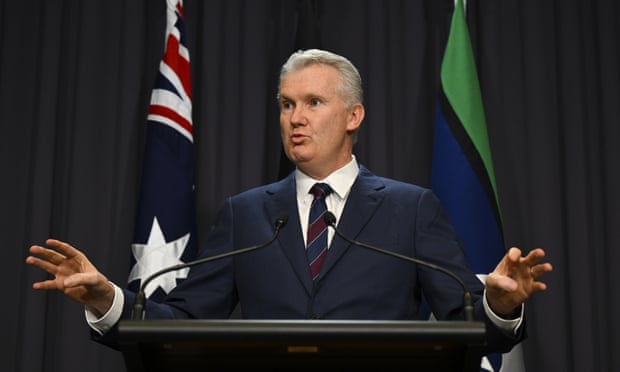Unions warn Tony Burke against potential debate on the better-off-overall test
Workplace relations minister opens door to considering industrial relations changes as he announces gutting of building watchdog

Workplace relations minister Tony Burke said he had been ‘sceptical’ about having a conversation with employers and unions about the better-off-overall test because he wanted Australian workers to have higher wages and conditions.
Photograph: Lukas Coch/AAP
Katharine Murphy
Katharine Murphy
Political editor
THE GUARDIAN
Sun 24 Jul 2022
Workplace relations minister Tony Burke has confirmed the current better-off-overall test that ensures workers do not go backwards will be on the table for discussion at the Albanese government’s jobs summit in September.
Burke said on Sunday he had been “sceptical” about having a conversation with employers and unions about the test, known as the Boot, at the September summit because he wanted Australian workers to have higher wages and conditions. The minister told the ABC he would “take some convincing” to overhaul the test.
But Burke confirmed no issue was off limits. “Everything’s on the table is the starting point. Everything’s on the table.”
Advertisement
The Australian Council of Trade Unions secretary, Sally McManus, expressed concern after Burke’s signal.
Workplace relations minister Tony Burke has confirmed the current better-off-overall test that ensures workers do not go backwards will be on the table for discussion at the Albanese government’s jobs summit in September.
Burke said on Sunday he had been “sceptical” about having a conversation with employers and unions about the test, known as the Boot, at the September summit because he wanted Australian workers to have higher wages and conditions. The minister told the ABC he would “take some convincing” to overhaul the test.
But Burke confirmed no issue was off limits. “Everything’s on the table is the starting point. Everything’s on the table.”
Advertisement
The Australian Council of Trade Unions secretary, Sally McManus, expressed concern after Burke’s signal.
“The job is to propose changes that will ensure wages grow, cutting protections that stop wages going backwards will do the opposite,” she said. McManus said the challenge for the summit was “for all of us is to think bigger”.
“The current set of laws have overseen such serious wage stagnation that even low unemployment, high profits and growing productivity are not shifting wage outcomes to where they should be,” she said. “Hopefully employers will not approach the job summit with the attitude of protecting their record profit share at all costs”.
Burke was asked about a deal between the ACTU and the Business Council of Australia in 2020 where union-approved deals would be fast‑tracked even if there was one hypothetical worker left worse off under the agreement.
The minister said he was on the hunt for points of consensus between employers and unions at the September summit. “I don’t know whether the consensus of that agreement of a couple of years ago will still exist in an identical form, but if a consensus like that turns up at the jobs summit you can work on the basis that I’ll be inclined to grab it.”
Burke’s decision to open the door to further dialogue on the Boot followed confirmation on Sunday the government will gut the Australian Building and Construction Commission (ABCC) ahead of abolishing the controversial body in 2022.
Trade unions welcomed Burke’s move. But employers and the opposition blasted the decision.
Burke declared the ABCC had been set up by the Liberals and Nationals “to discredit and dismantle unions and undermine the pay, conditions and job security of ordinary Australian workers”.
He argued the ABCC’s record suggested the building watchdog had “been more concerned with pursuing and punishing workers than tackling rampant wage theft and compromised safety standards”.
But the chief executive of the Ai Group, Innes Willox, said the Albanese government’s decision to gut the building code was of “great concern to businesses and should be of great concern to the broader community”.
Willox said Burke’s changes were “a backwards step for the fight against bullying and intimidation” and would add “costs and delays to vital community infrastructure such as roads, hospitals and schools”.
Willox said among other things, the changes Burke flagged on Sunday would abolish drug and alcohol testing requirements that apply on projects funded by the federal government. “Workers should not have to risk their lives or limbs by working alongside other workers who are impaired by drugs or alcohol.”
He said the ABCC and the building code were “playing a critical role in addressing bullying and intimidation by union officials on building sites”.
The shadow workplace relations minister, Michaelia Cash, said the construction industry was the key to Australia’s economic recovery, and “the abolition of the ABCC will bring chaos to the building and construction industry”.
“We can now expect jobs will be lost, one of the nation’s most militant unions the Construction, Forestry, Mining, Maritime and Energy Union will run riot, building costs will sky-rocket and large and small businesses will fold,” Cash said.
“Who is going to protect workers in the construction industry from thuggish behaviour and who’s going to stop the harassment of women and worse?”
Burke said the changes would remove prohibited enterprise agreement content requirements that are not imposed on other workers under national workplace laws.
He said Australia’s building and construction workers would be able to “freely bargain for agreements in the same way as other workers – including agreements that include clauses promoting job security, jobs for apprentices, and safety at work”.
Burke said a lot of what the ABCC had been doing could be done by another regulator, including the Fair Work Ombudsman or health and safety bodies.
No comments:
Post a Comment